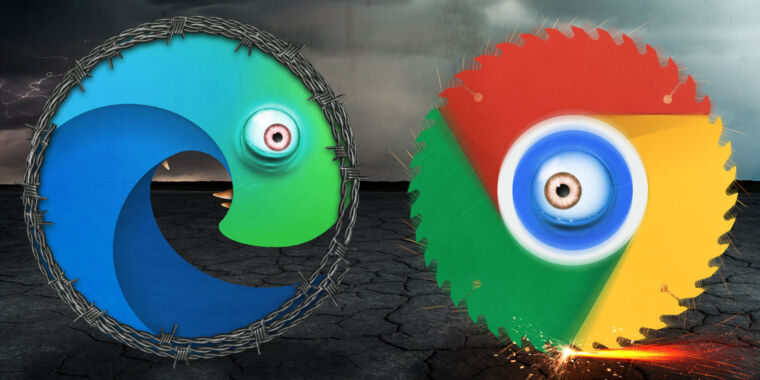- Users of Google Chrome on Windows 10 and 11 are reporting that they have suddenly found themselves using Microsoft Edge, with their Chrome browsing sessions appearing in Edge.
- This may be due to a bug or an accidentally clicked-through dialog box related to a feature in Edge that imports browsing data from Chrome.
- The setting, called “Import browsing data from Chrome,” continually imports data from Chrome every time Edge is launched, unlike the one-time import offered for Firefox.
- There have been concerns about Microsoft’s tactics for pushing its own browser, including notifications, pop-ups, and full-screen messages promoting Edge and Bing.
- Microsoft has become more aggressive in pushing various subscriptions and features in recent years, making a “clean” Windows install feel less so.
- It remains unclear whether the Edge data-import issue is intentional or a bug, highlighting concerns about Microsoft’s methods for promoting its own software.



It’s 2024 and yet, user programs can still steal data from each other. There should be some kind of permissions system in Windows, like in Android and additionally apps should ask if they can access data of other program.
I think there is, but 90% of windows apps resolve not to use that framework out of fear of the MS Store, even though you can theoretically install UWP apps outside of it.
the fact that a perms system is essentially opt-in for non UWP apps is laughable
I disagree. Back when Win32 was put together, these sorts of modern standards hadn’t been thought through by anyone yet. Even the internet wasn’t pervasive.
Windows finally decided “You know what, this API is ancient; let’s see what we can do to make it more secure and trustworthy.” That involves reorganizing the way these apps own files, make certain requests, etc. It meant it wouldn’t support the same stuff. But, by failing to claim any certain advantages aside from “safety FROM the apps you’re installing”, no one adopted it.
In fact they had been thought of, but few wanted to develop for it and nobody wanted to enforce it. Look at how old “capabilities” systems are.
https://homes.cs.washington.edu/~levy/capabook/
It’s the eternal problem of not wanting to break backwards compatibility which I totally get from a dev perspective. From a user security standpoint though, it kinda defeats the purpose of even having the system these days if it’s so easy to circumvent.
It’s very easy to achieve that security as a user, in a non-circumventable way. Just refuse to install anything made as a Win32 executable.
You’ll be unable to do most of what people do daily, but you’ll be secure. And, Windows even offered that as a potential OS setup - and it was instantly seen as “Microsoft’s effort to lock down the operating system to only apps they approve”.
Users DID have that mindset shift once before. Back in Windows 2000, EVERY app worked off admin permissions. In Vista, everyone started getting annoying permission dialogs on their old apps to access admin folders - and just started accepting them. But now that most apps are correctly designed to access user folders, sudden admin dialogs are a big point of user suspicion. In some reality, we’d do the same with “…What? You want me to manually run a .exe file I’ve downloaded in the browser??”
If there was a fiable framework for that in use by most applications, it’s fairly safe to say it would still have exceptions for the OS’s provided apps, “to improve the user experience”.
I think locking apps to only their own files is a terrible idea.
If a program creates unencrypted, unsecured files on disk, those files should absolutely be free game for any other program. Because if they’re not supposed to be read, they should not be unsecured files on disk.
I’m decently sure that macOS already does something somewhat similar. If a program wants to access files outside its own directory, you get asked for explicit permission to do that.
If my hardware is to be used as a public space then I expect it to be provided for free. While I foot the cost, it’s my property solely, and encryption status of the contents remains completely irrelevant. You sound like you’ve drunk the corporate KoolAid.
Nothing you’re saying makes sense in the context of the comment you’re replying to.
The onus isn’t on the environment owner to lock down app space and secure data to the nth degree, it’s on developers not to ship poorly behaved apps. My files don’t exist in a public space like they are rubbish on a residential nature strip, free to be pilfered by randos. They aren’t free game in any way.
Conversely: as the owner of my device programs should not be creating files that I can’t access any way I want. My .rar files shouldn’t refuse to be opened by 7zip.
I should, however, be able to uninstall any program (such as Edge) that I don’t want on my system. That is what the bullshit originates from.
Ya say you want this. Use Windows in S mode and you have it.
I’d never heard of S mode until my aging mother needed to get on a Zoom call with her doctor, and I couldn’t install the app on her laptop because of it.
I set her up to use the web browser mode instead. Leaving it on was for the best at that point. I kinda figured S mode meant senior mode like for old people or something, idk. It certainly prevented her from installing anything bad by accident: and it was just a youtube and email thing for her anyway.
Senior mode lmao
Yeah, you can only install from the MS store.
deleted by creator